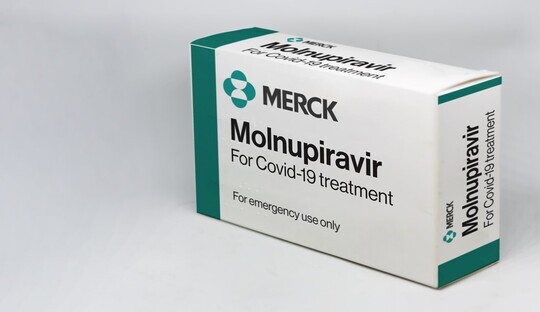7. Drug Updates
Oral antiviral treatment for COVID-19: Molnupiravir

According to a recent clinical trial, Molnupiravir is identified as the first oral, direct-acting antiviral found to be highly beneficial for treating Covid-19.
Eligible candidates for the study included outpatients with confirmed SARS-CoV-2 infection and symptom onset within 7 days. Participants were randomized 1:1 to 200 mg molnupiravir or placebo, or 3:1 to molnupiravir (400 or 800 mg) or placebo, twice-daily for 5 days. Antiviral activity was assessed as time to undetectable levels of viral RNA by reverse transcriptase polymerase chain reaction (RT- PCR) and time to elimination of infectious virus isolation from nasopharyngeal swabs.
The results show that among 202 treated participants, virus isolation was significantly lower in participants receiving 800 mg molnupiravir vs. placebo. As the treatment progresses, virus was not isolated from any participants receiving 400 or 800 mg molnupiravir, vs. those receiving placebo. Time to viral RNA clearance was decreased and a greater proportion overall achieved clearance in participants administered 800 mg molnupiravir vs. placebo.
The study concluded that molnupiravir is highly effective at reducing nasopharyngeal SARS-CoV-2 infectious virus and viral RNA and has a favorable safety and tolerability profile.
Effect of exenatide (EXE) on urinary albumin in obese T2D individuals

Obesity, especially abdominal obesity, is a major contributor of mortality in patients with type 2 diabetes. A recent study published in ‘Scientific reports’ revealed that EXE is an effective and safe way to control albuminuria in overweight/obese patients with T2DM.
In a randomized clinical trial, researchers investigated the effect of the glucagon-like peptide (GLP)-1 receptor agonist, exenatide on kidney function, obesity indices, and glucose control in overweight/obese patients with type 2 diabetes. The study cohort of 159 overweight/obese patients with T2DM was randomized to the EXE group or insulin glargine (GLAR) control group for a total treatment period of 24 weeks.
The key finding of the study was that 24-week EXE intervention significantly reduced UAC, which is significantly correlated with FGF 21. The levels of the anthropometric, glucose and lipid parameters (TG and HDL-c), and inflammation biomarkers (CRP and TNF-α) in the EXE group were improved at 12 weeks or 24 weeks, respectively compared with GLAR group. The results also showed that the patients in the EXE group presented more significant improvements in weight and glucose parameters (FBG, HbA1c). The study also unveiled a novel role of fibroblast growth factor 21 (FGF21) in the renoprotective effect of EXE.
According to the investigators, using EXE among overweight/obese patients with T2DM is more helpful than traditional outpatient services for better UAC and glycemic control.
For enquiries info@jothydev.net.
Please visit: jothydev.net | research.jothydev.com | diabscreenkerala.net | jothydev.com/newsletter




